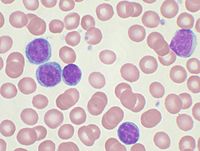
Photo from wikipedia
MYD88 (myeloid differentiation primary response 88) is mutated in the majority of Waldenström macroglobulinemia/lymphoplasmacytic lymphoma (LPL); but also, albeit less frequently, in other B-cell malignancies, including chronic lymphocytic leukemia (CLL).… Click to show full abstract
MYD88 (myeloid differentiation primary response 88) is mutated in the majority of Waldenström macroglobulinemia/lymphoplasmacytic lymphoma (LPL); but also, albeit less frequently, in other B-cell malignancies, including chronic lymphocytic leukemia (CLL). This suggests MYD88 as a central regulator of pathogenesis, but requests a broader approach to define diagnostically relevant genetic profiles for LPL and CLL. We identified the L265P hotspot mutation in 86% (n=67/78) of our LPL and 2% (n=12/767) of our CLL cohort. Importantly, in CLL (n=5), but also in LPL (n=4) other MYD88 mutations were identified. MYD88-mutated LPL was characterized by CXCR4 mutations (25%) and del(6q) (19%), whereas both aberrations were absent in the MYD88-unmutated LPL cases. MYD88-mutated CLL formed a prognostically favorable subset with a high frequency of del(13q), mutated IGHV status and no adverse aberrations (del(11q), del(17p), TP53 mutations). MYD88-mutated CLL differed from LPL with respect to cytogenetic aberrations and the absence of CXCR4 mutations. In both entities, based on mutation load evaluation, MYD88 mutations were found to be present in the stem clone in each case, whereas CXCR4 (LPL) and SF3B1 (CLL) mutations also occurred in subclones only.
Journal Title: Leukemia
Year Published: 2017
Link to full text (if available)
Share on Social Media: Sign Up to like & get
recommendations!